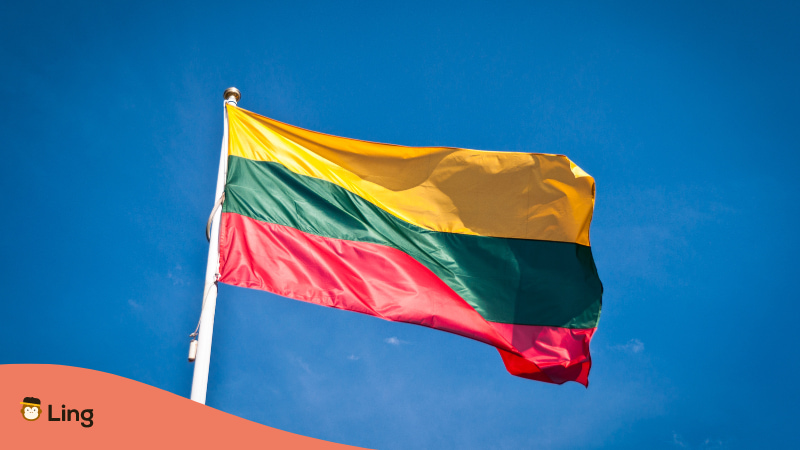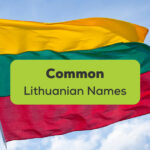Are you about to start learning Lithuanian, but the only thing stopping you from taking your first step is the question, “Is Lithuanian hard to learn?” If that’s the case, rest assured that you are not alone.
In this article, we will solve this mystery for you and give you the map you need to go in the right direction and reach your destination. So without further ado, let’s get started in learning Lithuanian!
About The Lithuanian Language
Excited to learn why people ask, “is Lithuanian hard to learn?” Then let’s get to know more about the language. Lithuanian is said to be 5,000 years old and is one of the oldest Indo-European languages. Lithuanian is the native language of Lithuania (a country in Europe). Lithuanian language originates from the ancient languages of Sanskrit, Latin, and Ancient Greek from different regions. For example, in the Lithuanian language, God is translated as “Dievas,” and in Sanskrit, it is “Deva.” However, the difficulty in learning Lithuanian is subjective to all.
Brief History Of The Lithuanian Language
Before we dig deep into this article, let us overview a brief history of the Lithuanian language. The Lithuanian and Latvian languages used to be dialects of one another in the old days. But in the year 800, they were categorized as separate languages.
In the thirteenth and fourteenth centuries, the development of the language slowed down, and in the sixteenth century, the first record of the Lithuanian language was traced. The situation continued until the end of the eighteenth century when rural people just used the language in a religious context. Modern-day Lithuanian literature was shaped by Jonas Jablonski in 1901 and 1919.
Hopefully, this helped in knowing the tidbits of why Lithuanian is a colorful language.

Why Do People Think Lithuanian Is Hard?
Now people have different lenses to look at this scenario. People deem Lithuanian to be unnecessarily complex because it has not simplified over time and is still intact in its Proto-Indo-European original features, which makes it a complex language.
Language learners believe that since it is a Baltic language (linked to Latvian, too), it is difficult to learn. Three million people worldwide speak the Lithuanian language as of now, among which most are native speakers of Lithuania. Many people learn Lithuanian to keep their culture alive, but it is not an easy language to become fluent in.
Pronunciation
Pronunciation is the fun part of every language since the primary purpose of having a language is to speak and communicate. Some people have difficulty pronouncing Lithuanian words because of their morphological structure. There are many reasons why the phonology of Lithuanian is complicated for English speakers, as it uses stress to explain the meaning of certain words.
Moreover, other than this, there are a lot of problems with pronouncing the soft/hard consonants in the language itself. So it is compulsory to pronounce the consonants correctly to determine their meaning; if not pronounced correctly, the purpose of the word is altered.
Accent
In the Lithuanian language, a pitched accent is used, which is difficult for English speakers or even people of other languages to pronounce. Hence, it is difficult to become fluent in Lithuanian right away without training your ears in how it sounds too.
Vowels
Lithuanian language is compared a lot with the Russian language due to its similarity to the case system. In the Russian language, five to six vowels are present. Still, in Lithuanian, there are two types of variations, one is the “short” vowel, and the other one is the “long” vowel, along with the presence of diphthongs which make it challenging to learn. In a nutshell, Lithuanian has twelve different vowels.
Verb System
Since Slavic languages have many sets of rules one needs to memorize, it becomes unnecessarily difficult to learn the verb system of Lithuanian. Because of its complex structure, it has many different elements to it. Only if one knows about the form of the language beforehand is it easier to learn it. Plus, the verb aspect is a little similar to Slavic languages.
Case System
As we have mentioned before about the case system, we know that the Lithuanian language consists of an irregular archaic case system due to its Indo-European nature. It becomes difficult to remember such case systems.
However, some languages with case systems, like German and Latin (these are Indo-European languages, too), are similar in this regard, and their speakers can understand this aspect to some extent.
Idioms And Phrases
Another addition to the complexity of the Lithuanian language is the use of idioms and phrases, which are very different because they are different in comparison to English and other languages.
Grammar
The grammatical structure of Lithuanian has many similarities with the Russian language, which is also very complex to learn. However, the use of grammar, e.g., verbs and Lithuanian nouns, are very different.
In addition, Lithuanian has ten grammatical cases and seven noun cases, with two types of genders, male and female gender, and shockingly no articles like in the English language. Henceforth, Lithuanian’s word order will make you a wreck.
But why fear when the Ling app is here? We are determined to make it all a piece of cake for you.

Do People In Lithuania Only Speak Lithuanian?
Okay, so now we will address one big misconception you might have. Just like “Indians speak Hindi only” and “Americans speak English only.” Lithuanians DO NOT always speak Lithuanian.
This might come as a shock to many, but many Lithuanians speak Russian or English perfectly well. There are different languages spoken in Lithuania, and there is the majority of Lithuanian speakers in Lithuania, but they have learned the tongue to keep the culture alive.
They are very good at Russian English, so if you want to settle in Lithuania, you don’t need to learn Lithuanian. However, if you are interested in learning the language, you can enroll in many Lithuanian courses.
Translating Lithuanian
Another thing that makes Lithuanian somewhat overwhelming is that since it is a complex language, it cannot be translated through Google Translate or any other language translator.
Most of the time, the translation given by Google is very different from the real meaning of the word. Another reason for difficulties with the translation of Lithuanian is its Latvian connection and archaic structure, which makes the language harder to a greater extent.
Lithuanian Alphabet
The Lithuanian alphabet consists of decorated consonants and vowels, for example, alphabets like Č and other words. These words are recognized by people who have learned Esperanto.
It uses palatalization a lot, and Palatalization is an essential component of the Lithuanian language. However, Palatalization depends on the placement of the vowels, which can change palatalization to a diphthong. And if you are coming from a language that does not use this aspect, then it will indeed sound hard.
Russian And Lithuanian
Many people link Russian to Lithuanian for many good reasons, and people think that the Lithuanian language is an accent of the Russian language, which is another misconception. A Russian person dating a Lithuanian person might also find it hard to communicate the proper meaning most of the time.
Let us look at the similarities and differences between both languages:
Comparison
First and foremost, the Lithuanian language is a Baltic language (only Latvian and Lithuanian are the last Baltic languages to exist), and Russian is a Slavic language.
Lithuanian languages still have kept the old Indo-European structure of the language and its grammar which makes it different from the Russian language because the Russian language has very different grammar and vocabulary. Moreover, Lithuanians have a lot more in common with Sanskrit than with Russian.
Similarities
There are not many similarities between the Lithuanian and Russian languages, but because of the same sound of some alphabets, the languages are confused with being interconnected.
Lithuania was once a part of the Soviet Union, which is why it borrowed some words from the Russian language, but that is all, and there is no other similarity.
Fun Fact
Also, one fun fact that I found fascinating during my research for this article was that there is no abusive word or phrase in Lithuanian. So yes, if you want to curse someone really bad, I suggest you switch to Russian since you might get exciting options. Not going to lie; I think of the Lithuanian language very highly now.
Lithuanian And Polish
Lithuanian and Polish languages are also compared a lot, and the reason for this is that the countries share borders. The Lithuanian language is influenced by Polish and Belarusian. Still, Polish and Lithuanian are again from different branches (Lithuanian is a Baltic language while Polish is the Proto-Slavic language), but they have the same alphabet structures.
Such as the usage of hooks on words; though Polish uses hooks on two alphabets, Lithuanian uses hooks on four alphabets. These hooks are also known as “ogonek.” The old Lithuanian is said to be much more similar to Polish than the new Lithuanian literature. However, with just a few phonetic changes, Polish can be changed to some Lithuanian words, but their spellings would be different.

How Do I Learn To Speak Lithuanian Fast?
If you have read all the details in the article above, you might be terrified to learn Lithuanian by now. We might have scared you enough, and you have probably dropped the idea of ever learning Lithuanian, but now we can tell you some points which may give you the hope of discovering the Gothic language again.
Try Memorizing The Alphabet
The best way to learn the language is none other than memorizing its alphabet. Some letters in the language have a similar pronunciation to English, so just focus and try to remember. Being a language learner is not that easy, but with determination and the proper guidance, it becomes a piece of cake.
Remember The Rules
The language follows strict rules, so learning it is not easy, which you know now. So try remembering the rules of names and surnames and what to put first and last. Plus, it would be great if you could place some greetings and phrases.
Grammar And Vocabulary
We all know it is essential to learn grammar, like Lithuanian sentence structure, before learning a language. Anyone who speaks Lithuanian knows that the grammar and vocabulary are exact, so to understand it, you can invest in a Lithuanian dictionary and use websites and courses on Google available online.
Watch And Listen To Lithuanian
Another way to learn the language faster is to watch a movie or news or listen to the radio or music in that language. Even trying to read a newspaper in that language is a brownie point if you want to learn the language faster. Doing all this increases your chances of understanding and learning the language.
Talk In Lithuanian
Many websites on the internet allow you to connect with native speakers of a specific language, and you can talk to them. Some online platforms, such as the Ling app, provide great opportunities to learn all different languages with online teachers. Also, if you know someone fluent in Lithuanian, converse with them and see the magic.
Visit Lithuania
No, I am not joking, surely if you want to learn a language, what is a better way than to travel to the country it originated from.
This is the best way to learn the language as it also opens you up to the country’s culture and traditions. Hearing the spoken language from so many people will make it easier for you to identify and re-evaluate your mistakes.
If you have money for the trip, that is good; otherwise, don’t go broke because you want to learn Lithuanian.
Is Learning Lithuanian Worth It?
The real question you had in mind before reading the article is going to be answered now. Well, for many good reasons, we can not answer this question for you as it varies from person to person and depends on your language learning abilities.
According to all that has been stated so far, it is pretty clear that the answer to this question varies. Learning a Lithuanian language sounds accessible to someone, and it may be difficult for others.
You can also read Professor Poliakovas opinion from his research about learning Lithuanian.
It is difficult for anyone to calculate the worth of learning Lithuanian because it is also an incredible feeling of pride to be among those 30 million people who can speak this ancient preserved language that has been intact for so many years, but it is easier said than done. So we are going to leave this matter in your hands.
I think this was a long ride for you, and now that all your questions have been answered, it is up to you if you want to learn the language or not. But do not let anyone tell you that you can not do it; it should only be you. So I hope we have helped answer your queries, whatever you choose to do. Best of luck if you are diving into learning Lithuanian.
Use The Ling App To Make The Most Of Learning Lithuanian
That’s it for this blog post. If you want to crack learning the Lithuanian language, deemed the hardest for many, check out the Ling app, which is your perfect inventory. I also considered learning languages hard until I came across the Ling app and realized that it is no more difficult if you have the right resources, and this app has it all.
Take out a moment and look into saying congratulations and countries and nationalities in Lithuanian. You can access the app on both Google Play Store and App Store and start learning the Lithuanian language.




































































One Response
Awesome article, Samaha.